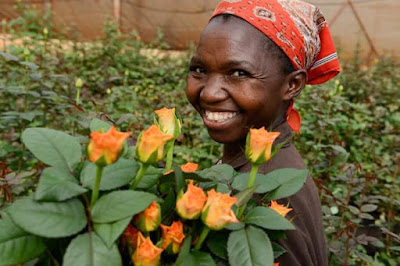Pause: Flower power in Kenya and Ethiopia: a sign of things to come. (By Dr Strive Masiyiwa)
 |
| Image Caption: Fair trade rose flower farm in Kenya which produces cutting flowers for export to Europe |
"Where once most cut flowers, including red roses, came from Holland. . .today they more likely come from Africa. New figures reveal a huge drop in Dutch production, in favour of imports from Kenya -- where roses are called "waridi" in Swahili -- and Ethiopia. Half a million people depend on the floriculture industry in Kenya alone,” according to the Daily Telegraph (14/02/16).
Holland still holds onto about half the cut flower market worldwide, but now Kenya and Ethiopia are the #4 and #5 cut-flower producers in the world! Together they earned more $1.3 billion in export sales in 2014. That’s 13.5% of global market share in a $9.1+ billion global market! Wow!
Proper growing of even one rose bush in your own garden requires knowledge of water, light, soil, pest management, fertilizers, and pruning. The best rose growers chalk up their success to a lifetime of experience and a lot of “TLC” (tender loving care).
How did Kenya and Ethiopia master all these processes to become world-class growers and exporters of cut flowers in this highly-sophisticated global market? They partnered and recruited experts from all over the world. They invested billions in the latest technologies, including climate-controlled transport terminals specially designed to ensure fresh flowers arrive quickly across the world looking as beautiful and smelling as nice as when they were first cut!
They listened to customers who say they really want to buy cut flowers that last a long time! They learned from the transfer of technology skills and best practices. Result: Kenyan and Ethiopian flower exports have expanded exponentially, making billions in forex earnings for their countries, and creating hundreds of thousands of jobs.
Research and development will continue as in any major industry. For example, flowers require a lot of fresh water to grow. That’s a scarce resource. Cultivation requires a huge number of workers. That means ensuring labour management that respects and protects workers and their families. They require a lot of sun (very plentiful in Kenya and Ethiopia on the Equator, so year-round growing is possible). But sometimes weather is unpredictable and supply must not be affected so that means investment in glass houses (also known as green houses).
This is floriculture, but why stop there?
__Who says we can’t go on to challenge traditional global market leaders in other industries over the next few decades? I believe we can!
Someday we’ll read stories like this on a regular basis about Africans rising up to dominate industries like textiles, electronic manufacturing, motor vehicle production, food processing, health care, and many others.
It won’t happen simply because we want to see it. We have to take practical steps to ensure it happens. I remember 20 years ago serving on the board of an investment fund set up by then President Bill Clinton, and chaired by Ambassador Andrew Young.
We identified horticulture as one of many potential industries where Africa could excel. We did extensive research to see what conditions and policies would be required for this to happen.
Although Kenya was behind several other countries at the time (and Ethiopia was nowhere to be seen, but if you ever met the Ethiopian PM Meles Zenawi and his colleagues nothing would surprise you today)… We all agreed that Kenya would take off, even though we had no idea how far they would go!
Now if you go to church on Easter Sunday, or a wedding any time of the year, and you see roses, you now know there's a very good chance they were grown in African soil under African skies. Don’t just see them as beauty… celebrate them as another way Africa is rising! Happy Easter.
End.



Comments
Post a Comment